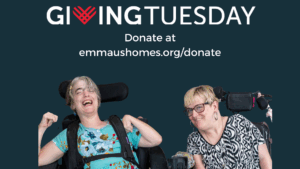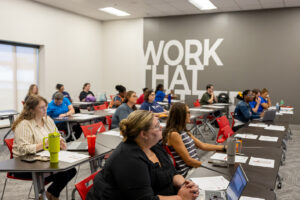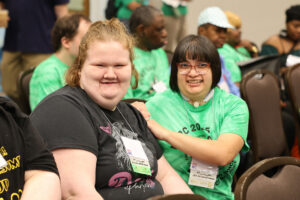
#IAmEmmaus: Rick Oberle
My heart was first opened to the ministry of Emmaus Homes as a high school student. My home church had an ongoing ministry with the Emmaus residents, bringing them to our church twice each year for fun, food and fellowship. In 2015, I was motivated to join the Board of Directors of Emmaus during the transition from campus living to community-based living. I was impressed by the bold and progressive thinking of the staff, putting increased care of our clients over the status quo.
In addition to board service, I choose to support Emmaus Homes financially because I see great integrity in their operations; deep, Christ-centered care for the clients in their charge; and a very bright future for their continued ministry. Serving on the board I see how deeply committed the staff is and that inspires me to be part of this ministry.
Now that I have moved to Columbia, MO, I continue to be connected to the mission of Emmaus Homes because I have seen firsthand the positive lifestyle change of so many clients who come to Emmaus from other facilities or their family home. I am also inspired by the personal growth of clients who move from campus living to community based living and I want to continue to be part of that change.
#IAmEmmaus: JoAnn Tiedemann
JoAnn Tiedemann, a retired librarian from the state of Wisconsin, has been working with local historian Cathie Schoppenhorst on our Emmaus Homes Heritage Project, made possible by the Reitz Family Endowment Fund. When we learned that JoAnn’s interest in this project “came about genetically”, we reached out to learn more about her family’s history with Emmaus.

“In 1907, my great-grandfather, Rev. Justus Wilhelm Frankenfeld, became the fifth superintendent of the St. Charles Emmaus institution. Before he was asked to become Superintendent, Rev. Frankenfeld was on the Board of Directors, the first ‘new generation’ after the Founding group. I believe he ended up taking on all the jobs that none of the others wanted to do anymore. Other Frankenfeld relatives were also involved with Emmaus in different ways. His family lived on-site; his oldest child, Frieda, eventually worked in the office. In 1921 she married Theophil Stoerker; they met when he had served at the facility during his seminary studies. After Rev. Frankenfeld sadly passed away from the stress and overexertion in 1929, Rev. Stoerker was called to be Superintendent.
My grandparents, Rev. Theo and Frieda Stoerker, led the St. Charles campus through 35 years of changes in language (German to English), funding, church and government policy, and medical advances (treatment and care of the medical and social needs of the residents), etc. until their retirement in 1964.
Rev. Stoerker not only volunteered as an Eden Seminarian (those were not the days of paid internships!), but, like most of the staff, he also voluntarily took a 50% pay cut during the Depression. As the provider for his family, this was quite a sacrifice. Frieda Stoerker worked much of her 35 years for free, in every position on the site.
My grandmother and siblings were not the only family I had involved with Emmaus, but also my mother and her siblings (including her younger sister, ‘Toosie,’ who volunteered in the summer — Camp Mo-Val, Katy Trail, swimming, field trips, recorder class, etc. — in more recent years), grew up as part of the Emmaus St. Charles community. My cousins and I fondly remember returning there annually for “Christmas at the grandparents'” until they retired.
In 2013, Toosie recommended that I, a librarian, come and help with organizing documents and records as an archive, which I first did after I retired in 2014. Since then I have returned five more times, most recently in August 2018 to assist local historian and archivist, Cathie Schoppenhorst, who is completing work with the materials currently available.” – JoAnn Tiedemann
Today JoAnn continues to work with Cathie on the Emmaus Homes Heritage Project. JoAnn also volunteers for the Max Kade Institute for German-American Studies in Madison, Wis., which examines and documents German-speaking immigrant influences on United States history and culture, including the establishment of Emmaus Homes.

#IAmEmmaus: EverSpring Pharmacy
EverSpring RX is an independently owned LTC Pharmacy specializing in ALF, ID/DD and Residential communities. Their “Patient First” focus, demonstrated consistently at Emmaus, is their number one priority. Emmaus chose EverSpring Pharmacy to start providing services over 5 years ago due to their customer focus towards our unique needs and requirements.
EverSpring staff are assigned to work with specific customers so it’s nice to have the continuity of speaking with just a few EverSpring employee’s when you’re calling from Emmaus.
A few years ago, EverSpring assisted Emmaus with the very useful transition from “bubble cards” (30 day supply of a medication; One medication per bubble card X the amount of time med was taken per day = enormous amount of bubble cards and space) over to the convenience of pillow packaging. Pillow packs can contain up to four different medications and have the client’s name, prescribed med/dosage and the date and time the pillow package is to administered. This has assisted our client’s family and friends to easily administer medications when they are away from their home without sending a large bag of bubble cards and causing confusion.
Our most resent adventure was to convert each of our clients over from a paper MAR system to an electronic MAR system. EverSpring staff provided many days of on-site training at our Emmaus corporate offices in St. Charles and Marthasville, MO. On the first day, when homes were scheduled to convert over to the electronic system, EverSpring provided four of their employees to visit the homes to assist with the first medication administration, as well as giving an opportunity to answer any Emmaus staff questions.
We worked in partnership for one year with EverSpring, providing this training and going on home visits until all of our community homes were up and running on the electronic-based system. We are blessed to work with such a dynamic crew at EverSpring who are always open to our questions and assist us with our ever changing requirements. EverSpring is truly part of our Emmaus Family!
#IAmEmmaus: Christina from YWCA
When it comes to teaching about healthy relationships and healthy sexuality to folks with disabilities, I frame our work as supporting freedom from harassment, abuse, and exploitation, and freedom to have meaningful, healthy romantic and/or sexual lives. While we initially got into this work as a component of preventing sexual abuse, we now see that our classes also support basic needs and rights of folks with disabilities.

I’ve been teaching with our SHADE (Sexual Health and Disability Education) program for 5 years. Before that, I worked here for 14ish years doing community and school presentations on sexual violence prevention.
I hope what they get is an open environment in which they could learn and share information about relationships, sexuality, and dating. As a society, we don’t have a lot of judgment-free places where folks can share and learn and get medically-accurate information about these topics. Once people have this information, I hope they use it to strengthen their current relationships, pursue new relationships, set and respect boundaries, keep themselves and others safer, and find greater pleasure and happiness.
I feel so privileged when students share the joy and messiness of their own lives when it comes to dating and sexuality. In our classes at Emmaus, we had some fun and important conversations about relationship structures, expectations, and fairness. I think sometimes people with disabilities aren’t expected to be in relationships, or the relationships they’re in are assumed to be drama-free and “innocent,” whatever that means. SHADE students remind me that people often are stumbling/skipping along in the hot mess that is relationships with or without guidance from others, and they have a lot of life wisdom.
I love watching how students start feeling more comfortable talking about sexuality over the course of the class. While we never ask or pressure students to share their own personal stories, over time many do, and we can see many of them relating this information to the relationships and encounters they currently have or have had in the past. I like to finish a class knowing that folks see sexuality as something that can be discussed, and that doing so will increase their likelihood of getting the good stuff and minimizing the bad stuff.
SHADE offers individual and small group classes on healthy relationships and sexuality to individuals with developmental disabilities. The curriculum we use as a base has 10 sessions, although we can do more or less depending on the needs/goals of the students. We can offer classes at our offices on Saint Louis University’s campus; at outside agencies; at schools; at public spaces like libraries – anywhere except the student’s own home. Support from the Productive Living Board in St. Louis County, the Office of Developmental Disabilities in St. Louis City, and the Kaufmann Foundation, mean that we can offer the class at no cost to eligible students.
People can learn more about our program by contacting us at (314)531-1115, or emailing me at cmeneses@ywcastlouis.org.


